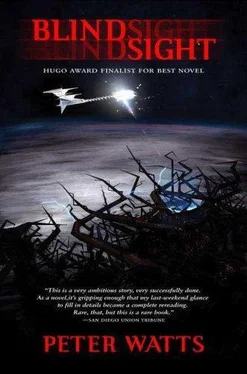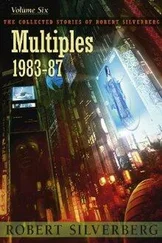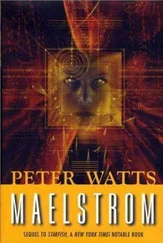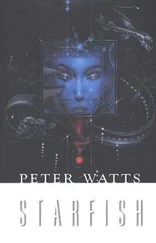It was such an obviously stupid question that Sascha didn’t have an answer for it. I could imagine her gaping in the silence.
“You’re not thinking this through,” Cunningham said. “We’re not talking about some kind of zombie lurching around with its arms stretched out, spouting mathematical theorems. A smart automaton would blend in . It would observe those around it, mimic their behavior, act just like everyone else. All the while completely unaware of what it was doing. Unaware even of its own existence.”
“Why would it bother? What would motivate it?”
“As long as you pull your hand away from an open flame, who cares whether you do it because it hurts or because some feedback algorithm says withdraw if heat flux exceeds critical T ? Natural selection doesn’t care about motives . If impersonating something increases fitness, then nature will select good impersonators over bad ones. Keep it up long enough and no conscious being would be able to pick your zombie out of a crowd.” Another silence; I could hear him chewing through it. “It’ll even be able to participate in a conversation like this one. It could write letters home, impersonate real human feelings, without having the slightest awareness of its own existence.”
“I dunno, Rob. It just seems—”
“Oh, it might not be perfect. It might be a bit redundant, or resort to the occasional expository infodump. But even real people do that, don’t they?”
“And eventually, there aren’t any real people left. Just robots pretending to give a shit.”
“Perhaps. Depends on the population dynamics, among other things. But I’d guess that at least one thing an automaton lacks is empathy; if you can’t feel, you can’t really relate to something that does, even if you act as though you do. Which makes it interesting to note how many sociopaths show up in the world’s upper echelons, hmm? How ruthlessness and bottom-line self-interest are so lauded up in the stratosphere, while anyone showing those traits at ground level gets carted off into detention with the Realists. Almost as if society itself is being reshaped from the inside out.”
“Oh, come on. Society was always pretty — wait, you’re saying the world’s corporate elite are nonsentient ?”
“God, no. Not nearly. Maybe they’re just starting down that road. Like chimpanzees.”
“Yeah, but sociopaths don’t blend in well.”
“Maybe the ones that get diagnosed don’t, but by definition they’re the bottom of the class. The others are too smart to get caught, and real automatons would do even better. Besides, when you get powerful enough, you don’t need to act like other people. Other people start acting like you.”
Sascha whistled. “Wow. Perfect play-actor.”
“Or not so perfect. Sound like anyone we know?”
They may have been talking about someone else entirely, I suppose. But that was as close to a direct reference to Siri Keeton that I heard in all my hours on the grapevine. Nobody else mentioned me, even in passing. That was statistically unlikely, given what I’d just endured in front of them all; someone should have said something . Perhaps Sarasti had ordered them not to discuss it. I didn’t know why. But it was obvious by now that the vampire had been orchestrating their interactions with me for some time. Now I was in hiding, but he knew I’d listen in at some point. Maybe, for some reason, he didn’t want my surveillance — contaminated…
He could have simply locked me out of ConSensus. He hadn’t. Which meant he still wanted me in the loop.
Zombies. Automatons. Fucking sentience.
For once in your goddamned life, understand something.
He’d said that to me. Or something had. During the assault.
Understand that your life depends on it.
Almost as if he were doing me a favor .
Then he’d left me alone. And had evidently told the others to do the same.
Are you listening , Keeton?
And he hadn’t locked me out of ConSensus.
* * *
Centuries of navel-gazing. Millennia of masturbation. Plato to Descartes to Dawkins to Rhanda. Souls and zombie agents and qualia. Kolmogorov complexity. Consciousness as Divine Spark. Consciousness as electromagnetic field. Consciousness as functional cluster.
I explored it all.
Wegner thought it was an executive summary. Penrose heard it in the singing of caged electrons. Nirretranders said it was a fraud; Kazim called it leakage from a parallel universe. Metzinger wouldn’t even admit it existed. The AIs claimed to have worked it out, then announced they couldn’t explain it to us. Gödel was right after all: no system can fully understand itself.
Not even the synthesists had been able to rotate it down. The load-bearing beams just couldn’t take the strain.
All of them, I began to realize, had missed the point. All those theories, all those drugdreams and experiments and models trying to prove what consciousness was : none to explain what it was good for. None needed: obviously, consciousness makes us what we are. It lets us see the beauty and the ugliness. It elevates us into the exalted realm of the spiritual. Oh, a few outsiders — Dawkins, Keogh, the occasional writer of hackwork fiction who barely achieved obscurity — wondered briefly at the why of it: why not soft computers, and no more? Why should nonsentient systems be inherently inferior? But they never really raised their voices above the crowd. The value of what we are was too trivially self-evident to ever call into serious question.
Yet the questions persisted, in the minds of the laureates, in the angst of every horny fifteen-year-old on the planet. Am I nothing but sparking chemistry? Am I a magnet in the ether? I am more than my eyes, my ears, my tongue; I am the little thing behind those things, the thing looking out from inside. But who looks out from its eyes? What does it reduce to? Who am I? Who am I? Who am I?
What a stupid fucking question. I could have answered it in a second, if Sarasti hadn’t forced me to understand it first.
“Not until we are lost do we begin to understand ourselves.”
—Thoreau
The shame had scoured me and left me hollow. I didn’t care who saw me. I didn’t care what state they saw me in. For days I’d floated in my tent, curled into a ball and breathing my own stink while the others made whatever preparations my tormentor had laid out for them. Amanda Bates was the only one who’d raised even a token protest over what Sarasti had done to me. The others kept their eyes down and their mouths shut and did what he told them to — whether from fear or indifference I couldn’t tell.
It was something else I’d stopped caring about.
Sometime during that span the cast on my arm cracked open like a shucked clam. I upped the lumens long enough to assess its handiwork; my repaired palm itched and glistened in twilight, a longer, deeper Fate line running from heel to web. Then back to darkness, and the blind unconvincing illusion of safety.
Sarasti wanted me to believe. Somehow he must have thought that brutalising and humiliating me would accomplish that — that broken and drained, I would become an empty vessel to fill as he saw fit. Wasn’t it a classic brainwashing technique — to shatter your victim and then glue the pieces back together in according to specs of your own choosing? Maybe he was expecting some kind of Stockholm Syndrome to set in, or maybe his actions followed some agenda incomprehensible to mere meat.
Maybe he’d simply gone insane.
He had broken me. He had presented his arguments. I had followed his trail of bread crumbs though ConSensus, through Theseus . And now, only nine days from graduation, I knew one thing for sure: Sarasti was wrong. He had to be. I couldn’t see how , but I knew it just the same. He was wrong.
Читать дальше









